After all the preparing and planning I've now actually arrived in Johannesburg.
Coach from Winchester to Heathrow worked well even if an accident on the M3 and resulting jams mean we arrived an hour behind schedule but that's why you allow plenty of time.
Flight with Virgin Atlantic was really very good. Decent food and an
inseat entertainment system that allowed you to access the film / TV
show of your choice from a large list as and when you wanted it. ( For
the record I chose the very good Captain Phillips with Tom Hanks).
Arrived into Johannesburg just ahead of schedule and smooth transfer to the hotel.
Weather good deal warmer than I've been used to of late though similarly damp with some strong showers in the afternoon.
As the day progresses the team has been steadily arriving from our various start points around the globe.
Five
of us managed to meet up this afternoon - great to actually put a face
to the voices I've been hearing on calls for so many months. Went for
an explore of the local area and achieved one of the important
milestones of a visit to any country... finding local supermarket where
you can buy some water :-)
Tomorrow we are off into the IBM office and a trip to a Museum to immerse ourselves in some history.
Friday, 21 February 2014
Thursday, 20 February 2014
All set for #ibmcsc South Africa?
After months of planning and preparations the day of departure has arrived.
The bags are packed … and after some judicious shuffling of content and removal of a few things are inside the weight allowance !
I am going to be working on a project in South Africa with IBM's Corporate Service Corps. Myself and 9 other IBMers drawn from across the business and the globe will be based in Pietermaritzburg. Split into 3 sub teams we will be working with local organisations on defined projects.
Having never been to South Africa, or indeed any country in Africa, this is certainly a journey into the unknown but one that I am certainly excited to be taking. As I have spoken with people over the last months about South Africa the resounding response form those who have been there before is that it will be an amazing month.
My intention is to post regular updates into this blog as the month progresses. If you want to see what my colleagues are posting as well then get on over to this page and look out for and posts for #IBMCSC South Africa
Time to go and sort out those last minute jobs before heading to Heathrow and my flight.
The bags are packed … and after some judicious shuffling of content and removal of a few things are inside the weight allowance !
I am going to be working on a project in South Africa with IBM's Corporate Service Corps. Myself and 9 other IBMers drawn from across the business and the globe will be based in Pietermaritzburg. Split into 3 sub teams we will be working with local organisations on defined projects.
Having never been to South Africa, or indeed any country in Africa, this is certainly a journey into the unknown but one that I am certainly excited to be taking. As I have spoken with people over the last months about South Africa the resounding response form those who have been there before is that it will be an amazing month.
My intention is to post regular updates into this blog as the month progresses. If you want to see what my colleagues are posting as well then get on over to this page and look out for and posts for #IBMCSC South Africa
Time to go and sort out those last minute jobs before heading to Heathrow and my flight.
Saturday, 15 February 2014
"Has Corporate Social Responsibility Failed"
A few notes from a talk by Wayne Visser at the University of Winchester as part of the a series of talks on "Responsible Management: Issues, Problems, Solutions"
Wayne suggested that Corporate Social Responsibility (CSR) has evolved through a number of stages.
Wayne suggested that Corporate Social Responsibility (CSR) has evolved through a number of stages.
- Age of Greed - Characterised by a defensive approach, doing enough but not changing any culture of greed in the organisation
- Age of Philanthropy - Characterised by a view that it doesn't matter how you make your money so long as you give it away.
- Age of Marketing - Characterised by a promotional approach where we see the use of media and CSR becoming all about PR.
- Age of management - a more strategic focus where we see alignment of issues with the business. Also likely to see use of some CSR standard as a framework but often this can reduce it to a tick box exercise.
These 4 stages he collectively categorised as CSR 1.0 and then suggested that we need to move to CSR 2.0 the Age of Responsibility where we see transformative power of CSR.
CSR 1.0 tends to fail for a variety of reasons
- Likely to be incremental, continuous improvement which improves things but is slow and gradual. Targets are set by the company themselves and progress tracked against that standard. If we accept that we live in a world where the challenges are large and urgent then slow and steady isn't going to cut it.
- Tends to be peripheral sitting in marketing or HR not integrated into the core of what the business does and hence reduced impact on the company than it might have
- Economic arguments won't necessarily lead to embracing CSR fully, market does not consistently value responsible companies
Much like the Web 2.0 world versus web 1.0, he suggested that CSR efforts need to focus on getting to scale as well as growing collaboration.
So how about some examples of what we are talking about ?
Some very creative approaches - such as "Cabbages and Condoms"restaurant in Thailand whose website interestingly leads with the social programs that they run rather than any images of the restaurant itself.
Scalability can be an issue if the issue of ethical concern doesn't capture most people's interest. A major retailer taking a position on an issue can however shift things such as Walmart's support for the Marine Stewardship Council standards. Also noted that sometimes government intervention is needed to prompt a shift in behaviour e.g. ban of incandescent light bulbs.
Glocality- thinking globally and acting locally. Variety of systems have emerged where buying one product means another is given away to someone who needs it. The One Laptop per Child's "Give 1 Get 1" program and Toms Shoes are good examples.
Circularity - focussing on closing the loop. Phone recycling from foneback cited as one example of a business built on this approach.
So lots of examples and in closing we were offered 2 tests for whether an organisation was embracing CSR 2.0
- Admission - do they recognise that they are part of the problem
- Audacity - are they setting audacious goals to transform versus incremental goals
An interesting evening and some inspiring examples of what some forward thinking companies and organisations are doing. I've added his book "The Age of Responsibility: CSR 2.0 and the New DNA of Business" to the list of titles it would be good to get around to reading.
Sunday, 15 December 2013
My first Coursera experience
"Congratulations! You have passed the course “Social Network Analysis" and received a Statement of Accomplishment."…. so ends my first, though most probably not last, experience of attending a course delivered via Coursera.
Given my role in IBM, personal interest in trying new technologies, and enthusiasm for learning new things, it was only a matter of time before I enrolled on one of the emerging group of virtual courses.
Coursera seemed a good place to start and so some months back I browsed the catalog of upcoming courses, found an interesting one that would give me an introduction to the analysis of social networks, and signed up.
Delivered by Lada Adamic from the University of Michigan the course was 8 weeks long. Each week we watched a series of videos that Lada had recorded where she would take us through some lecture materials and then set us homework to submit and complete. Homework often revolved around using a modelling tool (such as Gephi or NetLogo) to explore models that she had prepared and then answering multiple choice question based on what network behaviours the model allowed us to observe. Total time commitment probably averaged out around 2.5 hours a week.
There is clearly a limit to the amount that you can cover in 8 short sessions but I please to report that I very definitely emerge from this experience with a better understanding of Social Networks than I had at the start. Only problem is that now I want to go and learn more :-) We got a fascinating glimpse into how some of the network modelling approaches could be applied to things as diverse as drug development, recipies, and industry cartels, as well as the more expected Facebook style social networks.
One of the early pieces of homework was to analyse our own Facebook networks so here is a view of what mine looks like. The vertices/dots are people and the lines show links. The people included in the graphic are my Facebook friends, the links shown are the links they have to each other. I am not included as one of the dots - this is about the links my contacts have amongst themselves independent of me. Displayed this way you can start to see how my network has a variety of clusters in it. As you might expect the other IBMers that I am linked to have a tendency to know each other as well. Likewise my family members tend to similarly link to each other but much less likely to connect back into the IBM part of my network.
Given my role in IBM, personal interest in trying new technologies, and enthusiasm for learning new things, it was only a matter of time before I enrolled on one of the emerging group of virtual courses.
Coursera seemed a good place to start and so some months back I browsed the catalog of upcoming courses, found an interesting one that would give me an introduction to the analysis of social networks, and signed up.
Delivered by Lada Adamic from the University of Michigan the course was 8 weeks long. Each week we watched a series of videos that Lada had recorded where she would take us through some lecture materials and then set us homework to submit and complete. Homework often revolved around using a modelling tool (such as Gephi or NetLogo) to explore models that she had prepared and then answering multiple choice question based on what network behaviours the model allowed us to observe. Total time commitment probably averaged out around 2.5 hours a week.
There is clearly a limit to the amount that you can cover in 8 short sessions but I please to report that I very definitely emerge from this experience with a better understanding of Social Networks than I had at the start. Only problem is that now I want to go and learn more :-) We got a fascinating glimpse into how some of the network modelling approaches could be applied to things as diverse as drug development, recipies, and industry cartels, as well as the more expected Facebook style social networks.
One of the early pieces of homework was to analyse our own Facebook networks so here is a view of what mine looks like. The vertices/dots are people and the lines show links. The people included in the graphic are my Facebook friends, the links shown are the links they have to each other. I am not included as one of the dots - this is about the links my contacts have amongst themselves independent of me. Displayed this way you can start to see how my network has a variety of clusters in it. As you might expect the other IBMers that I am linked to have a tendency to know each other as well. Likewise my family members tend to similarly link to each other but much less likely to connect back into the IBM part of my network.
Friday, 25 October 2013
With power comes responsibility - Kim B Clark Fellowship at Said Business School
Some notes and reflections from my visit to Oxford for the launch event of the Kim B Clark Fellowship in Responsible Leadership at Saїd Business
School, Oxford University on Saturday 7 September.
At this event Professor Tufano (Dean of Said Business School) welcomed four speakers to share their thoughts..
- Kim B. Clark, in whose honour the Fellowship is named, President of Brigham Young University, Idaho, and formerly Dean, Harvard Business School.
- Clayton Christensen, Professor of Business Administration, Harvard Business School; Visiting Professor, Saïd Business School; the first recipient of the Kim B. Clark Fellowship.
- Kim S. Cameron, Professor of Management and Organisations, Ross School of Business.
- Charles Conn, Warden, Rhodes House, University of Oxford.
The talk was recorded and is available on the SBS YouTube Channel here
If you don't have a couple of hours free to watch the recording here are some of they key points I took away from it...
Clayton Christensen was the first speaker. He encouraged that people be taught how to think and stressed the importance of theories. Often theories get a bad press with people more interested in taking action. However, like it or not, our chosen course of action will be based on some belief that we hold on how things should work. Equipping leaders with good theories and an understanding of what circumstances they would work in would help to improve the decisions that they take.
Next up we had Kim Cameron who started by looking at some dimension of "Responsible". Could be in the sense of reliable, dependable, someone who follows through. Could also be responsible for something, in charge of assets, or people. Can also be about doing the right thing, creating goodness and this is the angle that he focused on with regard to responsible leadership. Introduced idea of virtuousness and how there are some things that are globally agreed in humankind such as being kind rather than abusive, better to be helpful than not.
I liked his idea of a "deviance continuum" - one one end we have negative abberant behaviour, in the middle we have normal behaviour and on the right positive deviance. Organisations exist to reduce deviance - we organise ourselves to reduce chaotic aberrant behaviour. In many contexts our focus is on reducing the negative abberance. eg medical research into resolving medical problems versus how we could go from healthy to spectacular. Responsible leaders are those that enrich life, they focus on the best of the human condition - ie virtuousness. At 40 mins through the video he discusses some examples of how responsible leadership can have positive business outcomes in terms of hard numbers as well as things like morale.
Charles Conn shared some interesting thoughts on Rhodes who had big ideas, big ideals, was greatly admired and had some very positive impacts. Would not however be seen as a responsible leader. Good ends we could agree with but means of achieving them were often less than positive. For a responsible leader it's not just the ends that matter - it's the means as well. He closed with a discussion of the clothing company Patagonia and their fanatical pursuit to be responsible and do no unnecessary harm.
Peter Tufano talked about 3 levels that relate to responsible leadership - Individual, Organisaton, Broader system. We can get people sensitised to issues and may even get them to say they will take a particular course of action but often we fall short of our good intentions. One question we need to reflect on then is how do you create an organisation that encourages more responsible behaviour versus a system that does the opposite. Quoted Ignatius and his warning on the route from riches to honours to pride as a way to failure ... how often though might people view following this path instead as success?
The final speaker was Kim B Clark. Listening to him it was clear why this fellowship is named in his honour. He is introduced around 1hr 15mins into the video - if you were to pick one person to listen to on the replay start with him. He noted that "Leadership is always and everywhere a moral act" - every leader takes the life of others in their hands and will affect it though their actions. Responsible leadership isn't just about the heart it's also about the mind, need to be able to motivate others, be decisive etc. What we need in our leaders is a responsible heart and a powerful mind - tough minded but not hard hearted.
If you are interested in seeing what someone else took from the event I found this write up on the Deseret News website
At this event Professor Tufano (Dean of Said Business School) welcomed four speakers to share their thoughts..
- Kim B. Clark, in whose honour the Fellowship is named, President of Brigham Young University, Idaho, and formerly Dean, Harvard Business School.
- Clayton Christensen, Professor of Business Administration, Harvard Business School; Visiting Professor, Saïd Business School; the first recipient of the Kim B. Clark Fellowship.
- Kim S. Cameron, Professor of Management and Organisations, Ross School of Business.
- Charles Conn, Warden, Rhodes House, University of Oxford.
The talk was recorded and is available on the SBS YouTube Channel here
If you don't have a couple of hours free to watch the recording here are some of they key points I took away from it...
Clayton Christensen was the first speaker. He encouraged that people be taught how to think and stressed the importance of theories. Often theories get a bad press with people more interested in taking action. However, like it or not, our chosen course of action will be based on some belief that we hold on how things should work. Equipping leaders with good theories and an understanding of what circumstances they would work in would help to improve the decisions that they take.
Next up we had Kim Cameron who started by looking at some dimension of "Responsible". Could be in the sense of reliable, dependable, someone who follows through. Could also be responsible for something, in charge of assets, or people. Can also be about doing the right thing, creating goodness and this is the angle that he focused on with regard to responsible leadership. Introduced idea of virtuousness and how there are some things that are globally agreed in humankind such as being kind rather than abusive, better to be helpful than not.
I liked his idea of a "deviance continuum" - one one end we have negative abberant behaviour, in the middle we have normal behaviour and on the right positive deviance. Organisations exist to reduce deviance - we organise ourselves to reduce chaotic aberrant behaviour. In many contexts our focus is on reducing the negative abberance. eg medical research into resolving medical problems versus how we could go from healthy to spectacular. Responsible leaders are those that enrich life, they focus on the best of the human condition - ie virtuousness. At 40 mins through the video he discusses some examples of how responsible leadership can have positive business outcomes in terms of hard numbers as well as things like morale.
Charles Conn shared some interesting thoughts on Rhodes who had big ideas, big ideals, was greatly admired and had some very positive impacts. Would not however be seen as a responsible leader. Good ends we could agree with but means of achieving them were often less than positive. For a responsible leader it's not just the ends that matter - it's the means as well. He closed with a discussion of the clothing company Patagonia and their fanatical pursuit to be responsible and do no unnecessary harm.
Peter Tufano talked about 3 levels that relate to responsible leadership - Individual, Organisaton, Broader system. We can get people sensitised to issues and may even get them to say they will take a particular course of action but often we fall short of our good intentions. One question we need to reflect on then is how do you create an organisation that encourages more responsible behaviour versus a system that does the opposite. Quoted Ignatius and his warning on the route from riches to honours to pride as a way to failure ... how often though might people view following this path instead as success?
The final speaker was Kim B Clark. Listening to him it was clear why this fellowship is named in his honour. He is introduced around 1hr 15mins into the video - if you were to pick one person to listen to on the replay start with him. He noted that "Leadership is always and everywhere a moral act" - every leader takes the life of others in their hands and will affect it though their actions. Responsible leadership isn't just about the heart it's also about the mind, need to be able to motivate others, be decisive etc. What we need in our leaders is a responsible heart and a powerful mind - tough minded but not hard hearted.
If you are interested in seeing what someone else took from the event I found this write up on the Deseret News website
Tuesday, 23 July 2013
Leading from the Frontier - 5th Oxford Africa Business Conference
Catching up on some blogging backlog.... back on the 18th May I attended a day conference on Africa at the Said Business School in Oxford. I've attended many events there over the years and this one was up to the usual high standards.
Here are a few notes and thoughts that I captured during the day.
One theme that came up a few times during the day was how we need to be careful not to think of Africa as a single entity but rather as a set of distinct countries. One session looked at Africa as 3 distinct regions
There is a need for development of physical infrastructure as well as regional cooperation.
The President of Republic of Rwanda, Paul Kagame, addressed the meeting after lunch. He talked about changes in Rwanda, I was struck most by the number of references to the importance of investment in the people to grow their capabilities and how that then leads to growth and increased success for the country.
In a session on Sustaining Social Impact there was some interesting discussion on the roles of charities and philanthropic money in helping to support growth. Importance of working in partnership with other organisations so that you create new markets or ideas but don't distort the existing markets. One interesting idea was a group that provided support for early stage entrepreneurs. They worked with the local banks so when then had someone apply for a loan but their business wasn't at the point where they could invest they would refer them on to the program. Having received the support to help develop their business ideas the entrepreneurs would then return to the financial institution hopefully in better shape to receive and capitalise on a loan.
Liked the comment that most companies fail - question we need to ask is what value did they create while they existed - and that value could be learning gain in some form.
We were also shown the rather wonderful video for Radi-Aid which is designed to make use reflect on our perceptions of Africa. As they say on the site imagine if everyone in Africa saw the video and this was their only source of information on Norway - what would they think about the country?
I attended the conference because I knew little of African Business and thought this would be a good way to find out more. Certainly feel I ended the day a little wiser.
Here are a few notes and thoughts that I captured during the day.
One theme that came up a few times during the day was how we need to be careful not to think of Africa as a single entity but rather as a set of distinct countries. One session looked at Africa as 3 distinct regions
- North Africa, seen a lot of political change in the recent years, growing stability.
- Tropics - where most growth is currently happening and seeing emergence of significant sized middle class.
- Southern Africa - seeing the slowest growth and also has the smaller population size.
There is a need for development of physical infrastructure as well as regional cooperation.
The President of Republic of Rwanda, Paul Kagame, addressed the meeting after lunch. He talked about changes in Rwanda, I was struck most by the number of references to the importance of investment in the people to grow their capabilities and how that then leads to growth and increased success for the country.
In a session on Sustaining Social Impact there was some interesting discussion on the roles of charities and philanthropic money in helping to support growth. Importance of working in partnership with other organisations so that you create new markets or ideas but don't distort the existing markets. One interesting idea was a group that provided support for early stage entrepreneurs. They worked with the local banks so when then had someone apply for a loan but their business wasn't at the point where they could invest they would refer them on to the program. Having received the support to help develop their business ideas the entrepreneurs would then return to the financial institution hopefully in better shape to receive and capitalise on a loan.
Liked the comment that most companies fail - question we need to ask is what value did they create while they existed - and that value could be learning gain in some form.
We were also shown the rather wonderful video for Radi-Aid which is designed to make use reflect on our perceptions of Africa. As they say on the site imagine if everyone in Africa saw the video and this was their only source of information on Norway - what would they think about the country?
I attended the conference because I knew little of African Business and thought this would be a good way to find out more. Certainly feel I ended the day a little wiser.
Sunday, 16 June 2013
Walking the Clarendon Way
A couple of weeks ago on 2nd June we walked the Clarendon Way as part of the annual fundraising event organised by a local children's Hospice Naomi House
The walk starts at Winchester Cathedral and ends 26 miles later at Salisbury Cathedral. Thankfully we had some great weather that day with plenty of sunshine but also a breeze so it wasn't too hot. Really impressed by the organisation of the whole day with plenty of marshall points offering bottles of water and a cheery word.
We'd done so training before the day but the longest walk we'd done as part of that was 18 miles so weren't sure how 26 would go. In the event it went well, though undoubtedly a little sore and tired when we stopped at the end we suffered no major issues. One of the biggest challenges was getting moving again after we'd spent 40 mins on the coach back to Winchester - the steps to get out are very steep when you've seized up a bit :-)
We started just after 8am so I thought I'd take a series of photos every hour to chart our progress through the day....
8am and ready for the start ....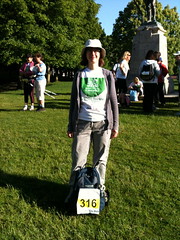
9am Olivers Battery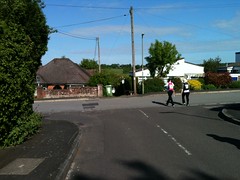
10am West Wood
11am countryside
Noon and some very welcome nourishment to help us on the last few miles to Broughton
1pm At Broughton and enjoying the delicious pre-ordered lunch.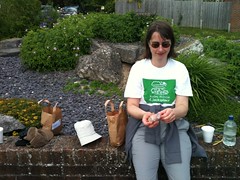
2pm - more lovely countryside passes by
3pm Crossing fields
4pm Getting steadily closer - but I'm sure one of the marshals a few miles back said "It's downhill all the way now..."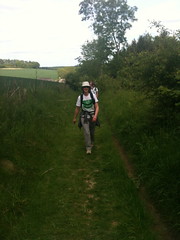
4:30pm OK - not on the hour but an important moment as we first see the spire of Salisbury Cathedral in the not too far distance...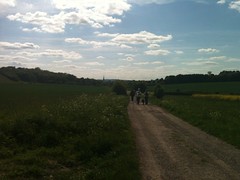
5pm Almost there, on the streets of Salisbury....
If you're in Hampshire/Wiltshire and looking for a challenge in aid of a good cause then I can heartily commend the Naomi House Clarendon Way to you.
The walk starts at Winchester Cathedral and ends 26 miles later at Salisbury Cathedral. Thankfully we had some great weather that day with plenty of sunshine but also a breeze so it wasn't too hot. Really impressed by the organisation of the whole day with plenty of marshall points offering bottles of water and a cheery word.
We'd done so training before the day but the longest walk we'd done as part of that was 18 miles so weren't sure how 26 would go. In the event it went well, though undoubtedly a little sore and tired when we stopped at the end we suffered no major issues. One of the biggest challenges was getting moving again after we'd spent 40 mins on the coach back to Winchester - the steps to get out are very steep when you've seized up a bit :-)
We started just after 8am so I thought I'd take a series of photos every hour to chart our progress through the day....
8am and ready for the start ....

9am Olivers Battery

10am West Wood

11am countryside

Noon and some very welcome nourishment to help us on the last few miles to Broughton

1pm At Broughton and enjoying the delicious pre-ordered lunch.

2pm - more lovely countryside passes by

3pm Crossing fields

4pm Getting steadily closer - but I'm sure one of the marshals a few miles back said "It's downhill all the way now..."

4:30pm OK - not on the hour but an important moment as we first see the spire of Salisbury Cathedral in the not too far distance...

5pm Almost there, on the streets of Salisbury....

If you're in Hampshire/Wiltshire and looking for a challenge in aid of a good cause then I can heartily commend the Naomi House Clarendon Way to you.
Subscribe to:
Posts (Atom)

